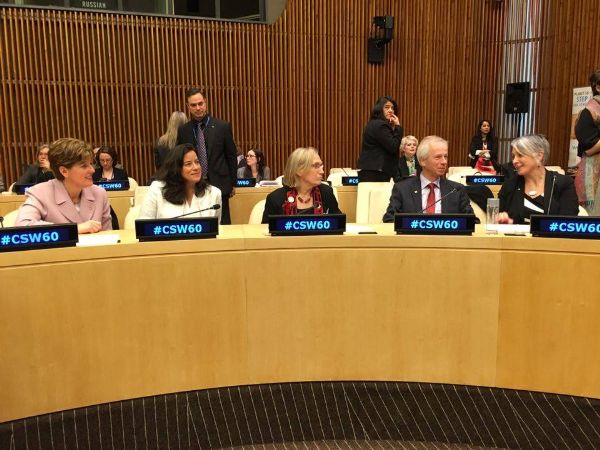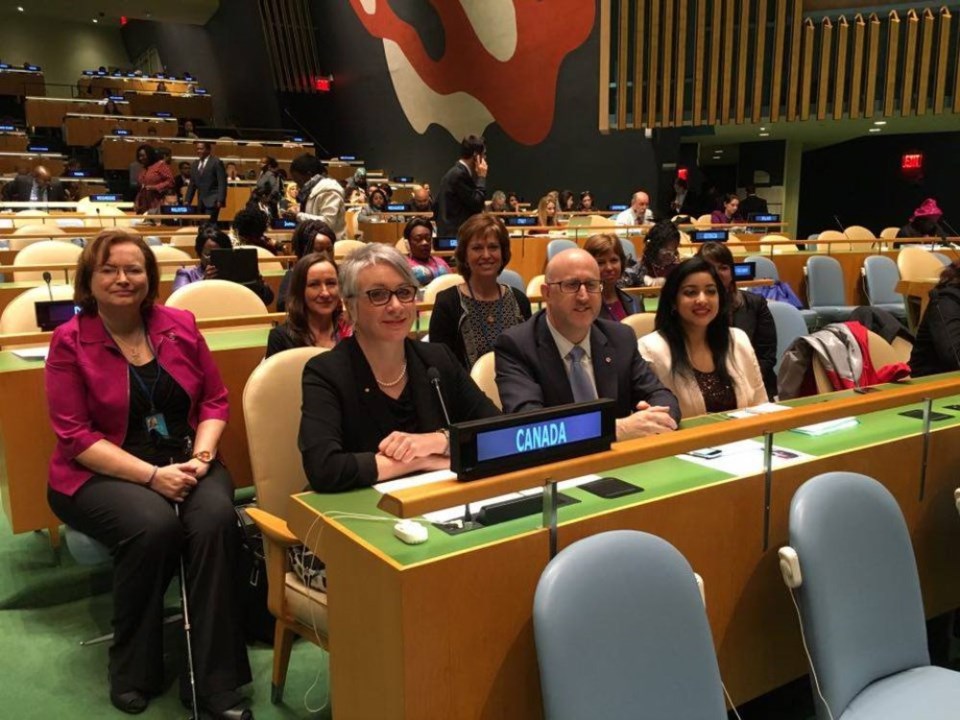Minister of Status of Women Patty Hajdu has returned from New York where she attended the 60th United Nations Commission on the Status of Women.
Hajdu led a Canadian delegation of four federal cabinet ministers, five provincial cabinet ministers and a variety of organizations from across the country.
Before returning, I had an opportunity to talk to Patty about her time at the UN and the many issues covered throughout the commission.
Scott Paradis, tbnewswatch.com: From the perspective of your ministry, what were some of the goals going into the UN Commission on the Status of Women?
Patty Hajdu, Minister of Status of Women: It’s really important for Canada to be a strong partner on the international stage in terms of gender equality. Our goal was to fully recommit to a fulsome relationship at the UN on the spectrum of gender equality rights including full reproductive rights. We really wanted to make sure the world knew (Canada’s) back in the fullest possible way. Our partners were thrilled by our statements at the sessions.
SP: “Canada is back” is something we’ve heard a lot since the delegation’s UN visit; can you tell me what that means?
PH: Canada’s done some great work, for example in terms of maternal and newborn health and some reproductive rights, but we’ve really pulled back from other areas. We haven’t been very vocal about the empowerment of women and women taking their place in terms of leadership rolls.
In terms of reproductive rights there was some controversy with the former government when they ceased to fund some reproductive options for women that included abortion. So when we say we are back and committed to funding organizations that fund full reproductive rights for women in developing countries it means we are not going to hold back foreign aid from organizations that provide those services to women. We believe that women do have the right to choose.
SP: Is it surprising to you that full reproductive rights appears to still be a (controversial) issue even in developed countries?
PH: Not really. Although I affirm a woman’s right to choose … I also understand that life is precious and that people struggle with the concept. People have different religious views, have different backgrounds and different personal experiences. I think it will always be a topic that we will have to be deliberate and thoughtful about. But I also believe we have to commit to women, especially women who maybe find themselves pregnant and have such circumstances in their life that makes having that child untenable at that particular time.
SP: In your address to the UN you made mention of the inquest into missing and murdered indigenous women. Canada’s historic treatment of its indigenous population is a bit of a black eye on our international reputation. Does Canada have any credibility issues when discussing these topics?
PH: I think our international partners are relieved that we are talking about it in an honest way. We are acknowledging as country that we have a history of colonization, sexism and racism. All of these things come together in a very toxic brew particularly for indigenous women and puts them at incredible risk.
So we have not shied away from the fact we know we have a problem in this area and must accept responsibility and must do better. We are not preaching to anyone. What we’re saying is we are taking the concerns seriously that the international community has had on Canada’s record with indigenous people in general and indigenous women and girls.
We presented this from a place of humility. We know we must do better and here are our plans to move forward.

SP: Prime Minister (Justin Trudeau) made headlines when he labeled himself a feminist. He added that he hoped one day such a declaration would be common enough to not warrant headlines. From your perspective, what does it mean when a man self describes himself as a feminist?
PH: For me it means they are asserting that men and women are equal and should have equal opportunity and treatment in society. What the prime minister is really asserting is that he believes in gender equality.
For me, when men stand up and behave as our allies it makes that work go by so much faster … with allies you can move things forward in a much more rapid way.
When the prime minister appointed me (as Minister of the Status of Women) in our very first conversation he said to me “this portfolio has been minimized and not considered very busy. But trust me you will be very busy and I believe you have the skills to tackle this.” I had no idea just how busy my portfolio would be. The agency I am responsible for has never seen this type of attention and volume before.
Finally, I am the first full cabinet minister for the Status of Women. That’s an indication of (Prime Minister Justin Trudeau’s) commitment to ensuring that gender equality is addressed in a very fulsome way in our country and those are the kind of allies that we need.
We need men with power to step up and insist on gender equality. When they do we can move this agenda that much farther and that much faster.
SP: As you’ve already said, it’s the first time the (Status of Women Ministry) has been a full ministry but that comes at a time when statistics show the gender wage gap hasn’t been shrinking in recent years. Is that a symptom of these issues not being treated as seriously as they should have been?
PH: The gender wage gap has been growing actually. The fact that we have a gender wage gap that is widening, the fact that we still see astronomical rates of violence against women and girls, the fact that we have a culture that still objectifies women in a very significant way and we don’t have a dialogue about that, I think these are all symptoms of a lack of focus in our country and other countries on issues of gender equality.
I think the way the prime minister if framing gender equality is quite smart. He isn’t just talking about gender equality for the human rights aspect, which of course there is.
There’s also a strong fiscal connection to increasing women in leadership through having women take their full place in terms of equal partners on the business and political stages.
What we see is that companies do better when they have more women at the boardroom table and at senior management positions.
Our big banks are figuring this out. RBC, the Bank of Montreal have done dedicated themselves to focus on gender equality and ensure that women are rising through the ranks and obtaining leadership positions and they are seeing a return on investment.
(Gender equality) should be strong enough as a human right’s issue, but as you know from other social issues we sometimes have to make a fiscal case.
SP: does this fiscal case broaden the definition of what modern women’s rights are now?
PH: The fiscal case is interesting because the question of why adding more women leads to better financial outcomes has not been fully researched or understood. The fact remains that it does.
Fortune 500 companies that have 30 per cent or more women on their board see on average a 15 per cent increase in their profits. Why is that? There are some theories.
There are theories that women are more co-operative, collaborative, tend to look for opportunities to work together, have a different way of thinking, can reach a different market in different ways. That makes sense right? When you’re excluding 50 per cent of the population from your decision-making team you’re actually not able to understand how to reach that market.
I think as we move forward we will begin to understand those connections better.
SP: So with New York in the rear-view mirror, what’s the next step for your ministry?
PH: My agency is working diligently, looking at our mandate letter and putting together a plan with priorities. We’ll be moving forward on the federal gender-based violence strategy.
We’re starting to have consultations with provinces and various civil society agencies. As we move into the summer that will probably be the focus of our agency and we’ll keep you posted.
The above interview has been condensed and edited.
